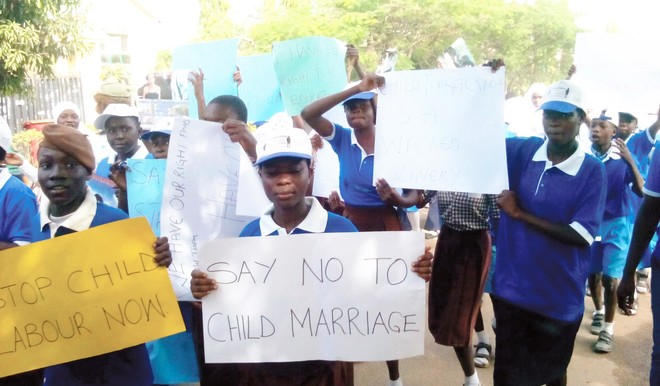Children on the edge: A 19-day struggle against violence
The children began gathering at 7.00a.m. in front of a police station in one of the largest neighbourhoods in Abuja. They chatted, but they were sombre: their placards showed their anger. “We are the future; care for us,” declared one. Another said, “Stop child labour.” Bullying is an issue thrown into the mix, and they […]


The children began gathering at 7.00a.m. in front of a police station in one of the largest neighbourhoods in Abuja. They chatted, but they were sombre: their placards showed their anger.
“We are the future; care for us,” declared one. Another said, “Stop child labour.” Bullying is an issue thrown into the mix, and they are all not going away, experts in child and women protection worry.
In minutes, the children-close to a hundred of them from different schools-take their protest/rally through the streets of Galadima. They stop to talk to whoever listens. They terminate at the palace of the Sarkin Galadima, Habakkuk Gozho.
In turns, they open up to the ruler. “Teach our parents to take care of their children,” says Sabina Atusiuba, 14, from Government Secondary School, Gwarinpa.
The concern she raises has come to the notice of the National Human Right Commission.
Up to a third of cases the commission and the police deal with are related with violence against children.
“A four-year-old girl raped by her uncle; a ten -year -old boy beaten to death by his father; yet another heart wrenching story of abuse,” says Chidi Odinkalu, who chairs the commission and has become a goodwill ambassador on ending violence against children.
“No day passes without similar stories in the media. Many of us will sigh and turn the page, searching for the financials, the latest corruption scandal, or the sports news. We seem to have become desensitized to these horrors our children suffer.”
His words came on Universal Children’s Day, which has pushed up social media campaign on every platform to ignite passions on behalf of children.
For 19 days this November, the same passions have been lit around the world. It began since the World Women’s Summit Foundation pushed for 19 days every November to focus on issues affecting the world’s children.
Children in Nigeria were worked up about violence against and abuse of children on the 19th. A day before, their focus was children in armed conflicts.
For nearly three weeks, they’ve been agitated about the lives of children shackled in child labour or trafficking, denied education and protection-from home to school and everywhere in between.
Their present circumstance is everyone around them is a potential abuser and every situation is fraught with risks.
“Children sent out as househelp get raped,” says Veronica Umar, national coordinator of the non-profit Women Trafficking and Child Labour Eradication Foundation (WOTCLEF), which backed the rally in Abuja.
“Sometimes you don’t know the sort of abuse in the home-from uncles, drivers, other children, security, gardener. It could be anybody. Once you rape a child, you have spoilt that child.”
But few children trapped in difficult circumstances are willing to report, and those who report don’t get the support or help they need.
Secondary school student Paschal Owuagu knows he can report bullying at school but thinks he would sooner forgive than report. he’s mastered his own way of dealing with the situation.
Ruth Monday-Wilson, a fellow student, willingly looks up to the authorities of her school-after first reporting to her parents-to do something.
Openness is the root of getting children to trust parents, and sometimes other adults around them, in order to be able to talk freely. That’s a line the Gender Vanguard group, a community-development unit of national youth service corps members, have toed to reach parents.
“They should be friendly, not far away. If you are far away from them, they [children] won’t be able to tell you what’s wrong with them,” says a member Sarah.
The telling process is much straightforward for teachers, according to Abdulrahim Isiaka, a teacher at Great Heights School. They spend perhaps more time than parents in daily interaction with children.
“We sensitise our children, especially the younger ones, to make sure we teach them the strategies [abusers] use, so they will not be victims of child abuse.
